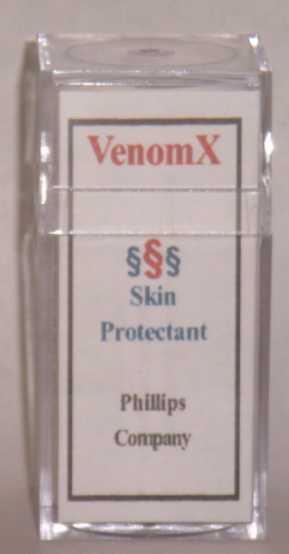Venomx | Zinc Acetate Liquid while Breastfeeding

What is Venomx | Zinc Acetate Liquid used for?
Brief: Active Ingredients Purpose Zinc acetate (.1% by volume) Skin Protectant
I am breastfeeding mother and I am using Venomx | Zinc Acetate Liquid. Can it have any bad effect on my kid? Shall I search for better alternative?

Venomx | Zinc Acetate Liquid Breastfeeding Analsys
Zinc while Breastfeeding
SafeCAS Number: 557-34-6
Zinc (Zn) is an essential element for nutrition. It is present in many foods.Recommended daily allowance of Zn is 8 to 15 mg. (Moran Hall 2010). Millions of people worldwide are Zn-deficient.It is used as a treatment for Wilson's disease and Acrodermatitis Enteropathica. Zn is involved in the regulation process of lactation (Lee 2016).Pasteurization of the milk does not affect the concentration of Zn and other trace elements (Mohd Taufek-2016). The average concentration of Zn in breastmilk is 4 to 16 mg / L (Picciano 1976, Hannan 2005, Dórea 2012) which is independent of plasma levels and maternal daily intake (Krebs 1995, Chierici 1999, Hannan 2009).Intestinal absorption of zinc is almost doubled during pregnancy and lactation (Fung 1997).Zinc levels in the infant are dependent on Zinc levels in the breast milk (Dumrongwongsiri 2015)With a varied and balanced diet, an extra intake of minerals is not needed. Excessive intake of Zinc may cause gastrointestinal problems and Pancytopenia (Irving 2003).
What should I do if I am breastfeeding mother and I am already exposed to Venomx | Zinc Acetate Liquid?
It is always a good idea to keep your healthcare provider or doctor informed about your drug usage during pregnancy and breastfeeding but if you have not informed your doctor about Venomx | Zinc Acetate Liquid and have used it then do not panic as Venomx | Zinc Acetate Liquid is mostly safe in breastfeeding and should not cause any harm to your baby.
I am nursing mother and my doctor has suggested me to use Venomx | Zinc Acetate Liquid, is it safe?
Usage of Venomx | Zinc Acetate Liquid is safe for nursing mothers and baby, No worries.
If I am using Venomx | Zinc Acetate Liquid, will my baby need extra monitoring?
No
Who can I talk to if I have questions about usage of Venomx | Zinc Acetate Liquid in breastfeeding?
US
National Womens Health and Breastfeeding Helpline: 800-994-9662 (TDD 888-220-5446) 9 a.m. and 6 p.m. ET, Monday through Friday
UK
National Breastfeeding Helpline: 0300-100-0212 9.30am to 9.30pm, daily
Association of Breastfeeding Mothers: 0300-330-5453
La Leche League: 0345-120-2918
The Breastfeeding Network supporter line in Bengali and Sylheti: 0300-456-2421
National Childbirth Trust (NCT): 0300-330-0700
Australia
National Breastfeeding Helpline: 1800-686-268 24 hours a day, 7 days a week
Canada
Telehealth Ontario for breastfeeding: 1-866-797-0000 24 hours a day, 7 days a week
